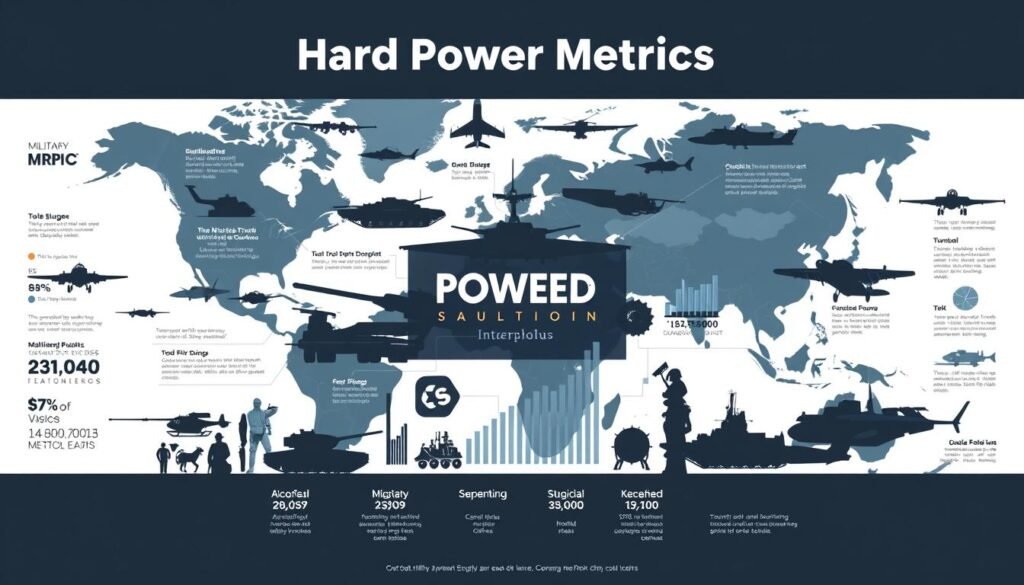In global politics, “hard power” is key to strategic influence and security. It means using military strength, economic power, and strong tactics to make other countries act as we want. This is different from “soft power,” which uses diplomacy and cultural influence.
Hard power lets countries use economic and military strength to make others do what we want. We offer rewards, like trade deals or protection, or threaten punishment, like sanctions or military action. This mix of rewards and threats helps control what others do.
Key Takeaways : Hard Power
- Hard power is the use of military and economic means to influence the behavior or interests of other political bodies.
- It involves the use of coercive tactics, such as economic sanctions, military action, and the formation of military alliances.
- Hard power contrasts with soft power, which relies on diplomacy, culture, and historical influence.
- Hard power is often associated with aggression and the direct exercise of authority in global politics.
- Understanding the dynamics of hard power is crucial for navigating the complex landscape of international relations and national security.
Introduction to Hard Power
In global politics, hard power is key. It means using military and economic strength to make other countries do what you want. This kind of power is seen as more forceful and can change others through direct action.
Definition and Meaning
Hard power is about using “carrots and sticks”. Carrots are economic benefits like trade deals or aid. Sticks are threats, like military action or economic penalties. This approach aims to make others act as you wish.
Distinction from Soft Power
Hard power is different from soft power. Soft power uses attraction and diplomacy to influence others. It comes from a country’s culture and values. The key difference is how each type works: hard power is direct and forceful, while soft power is more subtle.
| Hard Power | Soft Power |
|---|---|
| Relies on military and economic might | Relies on cultural influence and diplomatic persuasion |
| Involves coercion and threats | Involves attraction and persuasion |
| Focuses on immediate and tangible results | Focuses on long-term influence and attraction |
“Hard power involves the ability to use the carrots and sticks of economic and military might to make others follow your will.”
– Joseph Nye, political scientist and author
Historical Background of Hard Power
The idea of hard power goes way back to the start of the modern nation-state. The term is newer, but the idea of using money and military strength to shape others’ actions is old. This has been key in how countries have acted on the world stage for a long time.
The history of hard power is closely linked with its evolution and origins. Political groups needed to grow their hard power to protect themselves and spread their influence. This push for hard power helped shape and strengthen states over time.
“Power in international politics is the ability to influence the behavior of others to make them do what they otherwise would not do.” – Joseph Nye
Realists in international relations believe hard power is crucial in state competition. They say power comes from having things like people, land, resources, money, and a strong military. Hard power is seen as the main way for states to get what they want and stay safe.
- The roots of hard power go back to the 17th century and the rise of the modern nation-state.
- The evolution of hard power has been influenced by changes in world relations, new tech, and shifts in power balance.
- The history of hard power shows a constant drive for military and economic leadership. States wanted to grow their influence and protect what’s important to them.
- The historical development of hard power is a big part of the realist view in international relations. This view stresses the importance of power and using force to get what a country wants.
Elements and Components of Hard Power
Hard power is a key idea in international relations. It includes many types of strong policies and resources. At its heart, it has military strength and economic power. These are the main parts that make up a country’s military power and economic power.
Military Capabilities
Military strength is a big part of hard power. It looks at the size, strength, and tech level of a country’s military. It also looks at the quality of its defense setup.
The number and skill of soldiers, the type and quality of weapons, and how ready and quick the military is matter a lot. These things help figure out a country’s military capabilities.
Economic Strength
A country’s economic strength is also key to hard power. It means having control over natural resources, being able to make things, being innovative, and having financial power. A strong economy helps keep a strong military going. It can also be used to pressure other countries through economic means like sanctions or trade deals.
Studying and measuring these resources helps us understand hard power better. It shows how it affects global politics.
“Hard power is the ability to coerce others to do what they otherwise would not do, using the threat or use of military and economic means.”
| Military Capabilities | Economic Strength |
|---|---|
|
|
Hard Power and Realism in International Relations
The realist school of thought in international relations stresses the importance of hard power. They see the world as anarchic, where states must use their military and economic strength to survive. This is key to their security and survival.
Realist Perspective on Power
Realists believe power is the main thing in international politics. They think states aim to get more power to increase their global influence. The more hard power a state has, the better it can shape the world and stay safe.
Realists say wars and conflicts are common because states compete for power. They believe in using military force or economic pressure to protect their interests. This view sees the world as a place where power is everything.
“The more hard power a state has, the assumption goes, the higher probability the state has of being self-reliant and surviving in the international system.”
Applications of Hard Power in Foreign Policy
In global politics, hard power is key in a state’s foreign policy. It includes coercive diplomacy and economic sanctions. These methods help shape the actions of other nations and get what a state wants.
Coercive Diplomacy
Coercive diplomacy uses threats and pressure to make a state change its ways. It shows off military strength to make others listen. This method was seen in the United States’ attack on Iraq in 2003, aimed at stopping Iraq’s weapons of mass destruction.
Economic Sanctions
Economic sanctions are a way to use hard power too. They limit exports, banking, and investments, like the UN and many countries did with Iran to stop its nuclear plans. These actions put economic pressure on a country to change its decisions.
Hard power tactics, like coercive diplomacy and economic sanctions, can be risky. They might work in some cases but their long-term effects are debated. When making foreign policy decisions, policymakers must think about the possible outcomes and side effects.
Hard Power and State Formation
Building a state’s hard power is key to its creation and survival. Political groups aim to keep their state safe by growing their military and economic strength. This ensures they can keep going.
History shows that states without hard power struggle to stay independent. On the other hand, those with strong hard power do better in building their states. Armenia is a good example. It didn’t focus on building its hard power and couldn’t grow on its own.
| State | Hard Power Capabilities | State Formation and Development |
|---|---|---|
| State A | Robust military and economic strength | Successful state formation and growth |
| State B | Weak military and economic capabilities | Struggled with state formation and development |
| State C | Dependent on greater powers for hard power | Limited capacity for autonomous state formation |
Hard power is crucial for state development. Communities with strong hard power state building can keep their state going. Those without it face big challenges in hard power and state formation. The role of hard power in state development is key in hard power and state-building efforts around the world.
“The preservation of the state and the need to protect society, that is, the ability to ascertain sufficient hard power capabilities, led to the emergence of states as understood in modern times.”
Limitations and Critiques of Hard Power
The world has changed, making us question the use of hard power. Military and economic strength are still key, but their limits are clear. The limitations of hard power show up more often now.
International organizations, laws, and global challenges have changed the game. They make hard power less effective. This is why we see the diminishing effectiveness of hard power.
One big issue with hard power is it can’t solve complex problems alone. Issues like climate change and terrorism need global cooperation. The problems with hard power also show up in how people see wars. Wars seen as not defensive get a bad view from the world.
Diminishing Effectiveness in Modern Times
Globalization makes hard power less effective. Countries can’t just use force to get what they want anymore. We need a mix of hard power and soft power to work together on global issues.
| Limitation | Impact |
|---|---|
| Difficulty in addressing complex, transnational problems | Reduced effectiveness in tackling global issues like climate change, terrorism, and cybersecurity |
| Diminished public support for wars not perceived as defensive | Challenges in garnering international legitimacy and support for interventions |
| Increased economic interdependence and rise of transnational actors | Reduced ability for states to solely rely on coercive measures in achieving foreign policy goals |
As things change, we see the limitations of hard power more clearly. We need a balanced way to tackle global issues. Understanding the critiques of hard power and its limits is key for leaders today.
Hard power
In global politics, understanding a nation’s hard power is key. Experts and policymakers now have better ways to measure, quantify, and evaluate a country’s hard power. They use various hard power metrics for this.
Looking at hard power means checking things like military strength, economic size, population, and natural resources. By using stats and advanced analysis, experts can better understand a country’s hard power capabilities.
But, remember, measuring hard power isn’t a perfect science. History shows us that hard power doesn’t always lead to success in war or conflict. The fall of the Soviet Union, despite its strong hard power, is a clear example of this.
“A singular obsession with hard power cannot be the essence of a strong state.”
The study and use of hard power metrics are still vital as the world changes. They help us understand how international relations and national interests are evolving.
Interplay of Hard and Soft Power
In global politics, “hard power” and “soft power” have been widely discussed. These two types of power can be used together for a stronger approach called “smart power”.
Smart power uses both hard and soft power in a way that works well together. Armitage and Nye explain it as “an approach that highlights the need for a strong military. It also focuses on building alliances and partnerships”.
Leveraging Hard and Soft Power
How well hard and soft power work depends on how easy it is to use them. Big countries usually have strong military and economic power, key parts of hard power. Smaller countries often use soft power better, like cultural influence and diplomacy.
By mixing hard and soft power, smart power can be very effective today. This is because using only hard power isn’t enough anymore.
“Smart power is an approach that underscores the necessity of a strong military, but also invests heavily in alliances, partnerships, and institutions.”
Using both hard and soft power together helps a country reach its goals. This can be through strong diplomacy, economic actions, or building international partnerships.
In our complex world, smart power is a better way to handle global issues. It combines hard and soft power wisely for better results.
Case Studies: Use of Hard Power
The United States has shown how hard power works in its foreign policy. This is seen in the Iraq War and the economic sanctions on Iran. These examples teach us about using hard power in world politics.
The Iraq War: Hard Power in Action
In 2003, the U.S. invaded Iraq, saying it had weapons of mass destruction. The U.S. used hard power like military force to remove Saddam Hussein. This shows how hard power can be used to reach political goals, even if the reasons behind it change.
Economic Sanctions on Iran: Coercive Hard Power
The U.N. and many countries, including the U.S. and the E.U., put economic sanctions on Iran. These sanctions aimed to force Iran to talk about its nuclear program. This shows how economic pressure can be a tool to change a country’s actions.
| Case Study | Hard Power Measure | Outcome |
|---|---|---|
| Iraq War | Military Intervention | Overthrow of Saddam Hussein, subsequent instability in Iraq |
| Iran Sanctions | Economic Coercion | Negotiation of a nuclear deal to limit Iran’s nuclear program |
These hard power examples show how states can use military and economic pressure to meet their goals. But, the long-term effects and unintended outcomes of these actions are still being debated.
Future of Hard Power in Global Politics
In today’s world, the growth of international groups and soft power makes us wonder about hard power’s role. Yet, events like the Ukraine conflict show us that military and economic strength still matters a lot. It shapes the world’s politics.
The idea of realism, focusing on hard power, is being questioned more. But, it still plays a big part in understanding international relations. With powerful countries always around, hard power will likely stay key in global politics. Nothing else, like international laws or groups, can change the results of big conflicts between strong states.
The future of hard power is tied to the changing global challenges. As threats like cyber attacks and climate change grow, using hard power to deal with them will become more important. Leaders need to find a balance between using hard and soft power to handle today’s complex world.
| Factors Shaping the Future of Hard Power | Potential Implications |
|---|---|
| Technological advancements in military capabilities | Increased precision, range, and lethality of weapons systems |
| Geopolitical rivalries between major powers | Heightened tensions and the potential for armed conflicts |
| Emerging security threats (e.g., cyberattacks, climate-related conflicts) | The need for a more comprehensive approach to national security |
| The growing influence of non-state actors | Challenges to the traditional state-centric model of power projection |
The 21st century brings new challenges for hard power in global politics. It will keep changing to fit the new world of international relations. The debate between hard and soft power will go on. But, one thing is sure: hard power will keep playing a big role in global politics.
Also Read : How Does Global Governance Affect Environmental Policies?
Conclusion
Hard power has always been key in global politics. It uses military and economic strength to shape others’ actions or interests. Even though its importance is debated today, it’s still a big part of how countries interact.
But, using only hard power has its limits. Global connections, international groups, and new global issues have made it less effective in some cases. Mixing hard and soft power, or using smart power, works better in today’s world.
Yet, hard power will still be important in the future. Big countries will keep using their military and economic strength to get what they want and shape global events. The conclusion is that hard power is still vital, but it should be used wisely with soft power and smart power strategies. This approach is key to handling today’s complex global challenges.
FAQs
Q:What is the definition and meaning of hard power?
Hard power uses military and economic tools to shape others’ actions or interests. It’s a strong way to influence, especially when one country has more military or economic strength than another.
Q:How does hard power differ from soft power?
Unlike soft power, which relies on diplomacy and culture, hard power uses force and economic strength. Soft power aims to attract and convince, while hard power forces others to follow through coercion.
Q:What are the key components of hard power?
Hard power’s core includes military strength, like the size and tech of armed forces, and economic might. This includes resources, industrial capacity, and financial power.
Q:How does the realist school of thought view hard power?
Realists believe hard power is crucial in international relations. They think the world is chaotic and states need to increase their power. This includes using military force and economic pressure.
Q:How has hard power been applied in foreign policy?
Hard power has been seen in actions like the U.S. invasion of Iraq in 2003, economic sanctions on Iran, and military actions against the Islamic State. These were done to stop territorial gains and human rights abuses.
Q:What are the limitations and critiques of relying solely on hard power?
Hard power’s effectiveness has decreased due to globalization and international organizations. Relying only on it is seen as not enough for today’s global problems.
Q:How can hard power and soft power be combined for more effective strategies?
“Smart power” combines hard and soft power to work together better. This mix uses the best of both to achieve goals in global politics.
Q:What is the future role of hard power in global politics?
Hard power will still be key in world politics, as countries use it to get what they want and shape global events. But, using smart power that blends hard and soft elements will likely become more important.
Source Links
- https://en.wikipedia.org/wiki/Hard_power
- https://www.e-ir.info/2014/05/14/the-effectiveness-of-soft-hard-power-in-contemporary-international-relations/
- https://evnreport.com/magazine-issues/hard-power-and-its-limits/











